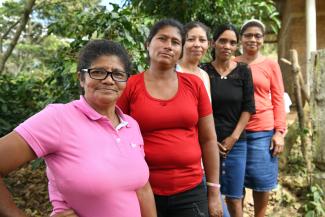USAID/HONDURAS ACTIVITIES TO ADVANCE GENDER AND SOCIAL INCLUSION & MITIGATE CONFLICT
Monitoreo y Evaluación para la Colaboración, Aprendizaje y Adaptación (MESCLA): USAID will improve all investments made in Honduras by strengthening the Mission’s monitoring and evaluation, and collaborating, learning, and adapting capacities. USAID will design and implement both quantitative and qualitative evaluations and assessments, and provide expert analysis to improve quality and measure the impact of programming in reducing irregular migration.
Integrated Responses on Migration: This agreement strengthens the capacity of the International Organization for Migration (IOM) to support national authorities to improve and expand in-processing and care of returning migrants; contribute to enhanced government capacities to address root causes of irregular migration, alleviate push factors, and strengthen prevention measures; upgrade infrastructure; and improve the availability, quality, and use of information to strengthen the reception and reintegration process.
Conflict Sensitivity Integration Hub (CSIH): CSIH is the first USAID-funded conflict sensitivity integration hub in the world. The program seeks to integrate conflict and violence prevention into USAID programming and increase evidence and learning on conflict sensitivity for the Latin America Region. CSIH trains implementers in conflict sensitive practices and offers tools and recommendations for dealing with challenges ranging from gang control of territories and conflict among Indigenous populations, to governance challenges and community disputes, all of which impact the ability to achieve U.S. foreign assistance objectives.
Indigenous Peoples’ Alliance for Rights and Development (IPARD): IPARD supports indigenous peoples in Honduras to overcome their greatest challenges through multi-sectoral, specific national context-focused, and indigenous project management approaches. IPARD organizes and convenes a capacity development program for indigenous peoples’ organizations and stakeholders; fosters an enabling environment for Indigenous Peoples’ recognition, effective participation, and joint decision-making in matters affecting them; and promotes indigenous peoples’ sustainable development based on self-determined economic models.

